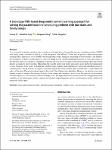Item Infomation
Full metadata record
| DC Field | Value | Language |
|---|---|---|
| dc.contributor.author | Funing, Li | - |
| dc.contributor.author | Sebastian, Lang | - |
| dc.contributor.author | Bingyuan, Hong | - |
| dc.date.accessioned | 2023-05-16T03:51:22Z | - |
| dc.date.available | 2023-05-16T03:51:22Z | - |
| dc.date.issued | 2023 | - |
| dc.identifier.uri | https://link.springer.com/article/10.1007/s10845-023-02094-4 | - |
| dc.identifier.uri | https://dlib.phenikaa-uni.edu.vn/handle/PNK/8455 | - |
| dc.description | CC BY | vi |
| dc.description.abstract | As an essential scheduling problem with several practical applications, the parallel machine scheduling problem (PMSP) with family setups constraints is difficult to solve and proven to be NP-hard. To this end, we present a deep reinforcement learning (DRL) approach to solve a PMSP considering family setups, aiming at minimizing the total tardiness. The PMSP is first modeled as a Markov decision process, where we design a novel variable-length representation of states and actions, so that the DRL agent can calculate a comprehensive priority for each job at each decision time point and then select the next job directly according to these priorities. Meanwhile, the variable-length state matrix and action vector enable the trained agent to solve instances of any scales. To handle the variable-length sequence and simultaneously ensure the calculated priority is a global priority among all jobs, we employ a rec | vi |
| dc.language.iso | en | vi |
| dc.publisher | Springer | vi |
| dc.subject | NP-hard | vi |
| dc.subject | PMSP | vi |
| dc.title | A two-stage RNN-based deep reinforcement learning approach for solving the parallel machine scheduling problem with due dates and family setups | vi |
| dc.type | Book | vi |
| Appears in Collections | ||
| OER - Kinh tế và Quản lý | ||
Files in This Item:

